Sergio Tomás Massa assumed responsibility for stabilising Argentina’s economy and lowering inflation in August 2022.
In his first long interview since becoming Economy and Production superminister, the 50-year-old analyses his first few months in office, along with outlining his expectations and the challenges ahead in 2023.
Massa, valued by Argentina’s most relevant businessmen, projects economic growth along with the accumulation of reserves and – crucially for the International Monetary Fund – targets being met.
With inflation below five percent for two months running, does that idea of bringing it below three percent look more possible to you?
Three point something in April, because as the days go by, they keep moving the goalposts on me. I’m trying not to give many interviews because, among other things, I believe that it is time to speak with deeds, not words.
It seems important to me to have this opportunity of a long interview to sum up almost four and a half months but it also seems to me the time to act and not talk so much, that’s why I’m rather dodging interviews.
When we took charge, we defined four pillars…
... this is your first real interview as Economy Minister, you did something on television but shorter.
Yes, I did some very short interviews on radio or television but no long interviews, no.
Let’s get on with it then.
We’ll try and tell the people everything. Our first objective was basically every 75 days to...
... to lower inflation by one percentage point every six weeks.
No, every two months and a half.
To lower inflation by one percentage point every two-and-a-half months.
Exactly, that was the objective we set ourselves. We started out with a [monthly] inflation of 7.4 percent and in the first 60 days we were parked in the area of 6.3 to 6.4 percent. Our aspiration was to be parked around five percent in November and December and in this month too. We found the November figure striking because the biggest slowdown was above all in food and garments, which were the two most important agreements we reached. This permitted us to show November as ending up at 4.9 percent while December will also be four point something, according to the projection of our Economic Planning department. We’ll see when INDEC [national statistics bureau] publishes its figure.
Within two and a half months, inflation would have to go down a percentage point so that it would be three point something.
That’s the objective for April.
But two and a half months would take us into mid-March.
Sure, but above all because March is a seasonally complex month, we’re going to have to start working already on the school shopping-basket with the start of classes and it’s also when collective bargaining gets underway. We’re already advancing with the first collective bargaining with textile workers, bus-drivers and bank clerks. Along parallel lines we are also pushing ahead with our financial programme, with accumulating and boosting reserves.
We closed [2022] with a record accumulation of reserves since our government began and at a level well above the figure set by the programme with the International Monetary Fund (IMF) regarding the freely available reserves. We met the fiscal targets, closing with a fiscal deficit of 2.5 percent [of gross domestic product], very difficult because when we started out in office, real spending was running 12.6 percent ahead of inflation. And it was really very complicated to be able to imagine or envisage a scenario in which, without vaccines falling short, and without halting public works while continuing with housing starts and computers or notebooks for education, we could reach this objective. We brought order to many things.
The decision to unify agriculture, energy, mining, the knowledge economy, finance and domestic and foreign trade, all in a single ministry, gave us the possibility of working together with industry and the area of investment in regional economies on a programme which permitted us at least to begin lowering inflation. Inflation is still too high for my taste. Growth this year [in 2022] will be well above the 3.5 or four percent which most economic consultants and international organisations projected for Argentina...
... over five percent.
It will be well above five percent. And somehow, while maintaining levels of consumption, we had in October a month in which society became fed up with validating any price from those who, seeking dollar coverage, placed all kinds of markups on supermarket shelves. Consumer society at some point said: “Enough is enough.”
It seems to me that this shows the recovery in November and December with consumer levels maintained and activity growing. Installed capacity in industrial parks is at 70 percent, a historic figure for Argentina, while on average installed capacity is above 68 percent. The level of activity in November was up over both October and the same month in 2021, thus enabling us to battle inflation and order spending without cooling down the economy or painful austerity.
Reaching April with that projected three point something, that would give you something like 50 percent for the year.
Yes, a bit less if three is averaged throughout the year.
Probably, when you’re a bit more into the first quarter, the projection for 2023 will be around that and you will have to opt between a bit more inflation and a bit more growth or a bit less inflation and a bit less growth. Something which can differ at any time in history, I’m not saying that one is always better than the other. Which do you think would be better for Argentine society?
The real problem is that first you have to get them aligned. When the incentives are badly aligned, they give you phenomena like the carry trade. When you have the incentives well aligned with positive interest rates with the pass-through of the exchange rate behind interest rates and inflation behind both, you recover competitiveness without the need to pose such dilemmas.
The Argentine economy still has a margin to grow in volumes of consumption and production. And that depends centrally on another problem which does not appear in today’s agenda but this year or next we are going to have to place a very heavy focus on – i.e., access to credit. With the high interest rates and inflation real wages have fallen, let us remember that in the [Mauricio] Macri presidency they fell 19 percent and afterwards a further five percent with the pandemic. In the last half of last year we managed to recover almost 2.9 percent for formal employment but there is still a long way to go.
You’re saying that there is no such dilemma, as posed, for example, by the IMF, which recommends cooling down the economy a bit due to the risk of inflation.
That has already been asked for this year, hence the projection. We had our objectives in the agreement with the IMF and we complied with them, despite a war cropping up in the middle which cost Argentina US$5.2 billion for the increased cost of fertilisers and fuel (above all, liquefied natural gas). Let us remember that Argentina will have to import a lot less this year due to what the gas pipeline and the Plan Gas represent...
... half those US$5 billion.
And there will also be an additional volume of investment. Later on we can talk about investment as a percentage of GDP because 2022 was the highest in the last nine years.
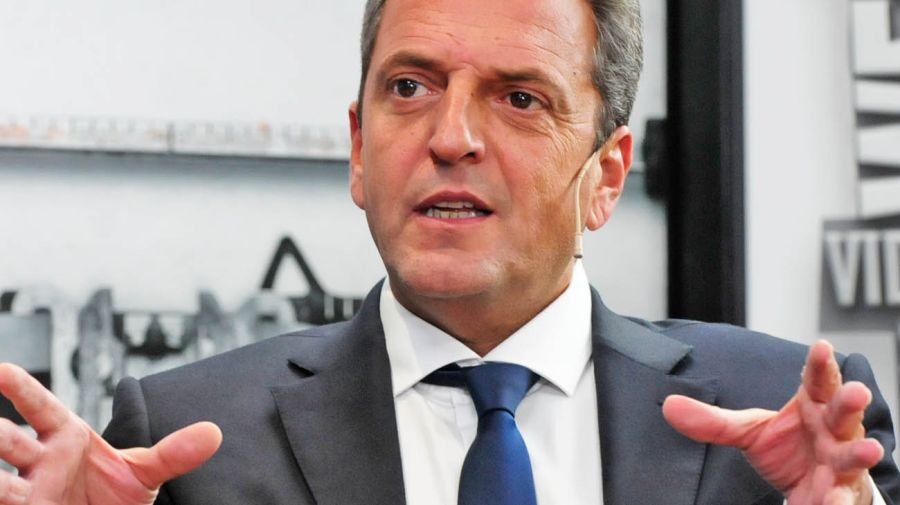
It improved last month.
So the problem is that the IMF presents objectives which have to do with seeking to guarantee debt collection. We understand the IMF concern as a creditor to want to collect but we want to pay by growing, not by freezing the economy because we understand that the latter had two results in Argentina – one bad, which we remember from a few years ago, and the other even worse which ended up in the crisis of 2001. So it is of central importance to understand that two-thirds of the Argentine economy is the domestic market, which we need to be vigorous.
We have stopped Treasury financing. When I took office, I said: “From here on to the end of the year, I’m not going to take any more assistance from the Treasury and furthermore, I’m going to return it symbolically.” And we could finance ourselves with private-sector participation in Treasury [bond] tenders, which is another great challenge for 2023. But centrally what remains clear is that we have met the targets in the agreement which Argentina signed with the IMF. But the IMF did not comply with all its end because Argentina lost US$5.2 billion but met the targets all the same, despite that. It seems to me that there is a discussion pending which is reflected in this letter to [IMF Managing Director] Kristalina Georgieva.
What do you imagine she’s going to reply?
She chatted with me and the President at the last G7 [summit in Bali] about an issue that I was going to place on the table. I don’t want it to be part of the discussion of the programme but if in some way it is going to be taken into account when defining the distribution of the funds from the IMF’s Resilience and Sustainability Trust and the special drawing rights, this would relieve Argentina of some of the interest burden.
Let’s follow up that point between cooling down and growing. There have been some signs of consumer-led growth, but not investment, stagnating and even going down in some months. You were recently optimistic but some analysts think that Argentina will grow very little although they are the same analysts who said that it was going to grow less this year and it grew well over double. How do you interpret the signals in the last few months, for example, the revenues from the IVA value-added tax, which are displaying a trend to grow less than last year?
In the case of the IVA revenue there is a postponement of nine million tons of grain from the entire first quarter. We are really trying to optimise resources. The first challenge we had was to bring order to all the economic variables and place them under political leadership because the economic variables in themselves are just numbers. Now as for my expectations for this year, the first is to grow more than three percent, which would be the third year running of growth. Argentina has not grown three years running in a long time.
Since the first years of Néstor Kirchner.
Secondly, it seems to me that we have an additional challenge.
That was when you ceased to be Cabinet chief [that Argentina stopped growing].
Yes. Secondly, a challenge which seems important to me is to broaden our credit capacity, as I was telling you beforehand because when we measure our level of credit against our GDP, our population and Argentine companies, it is still very small with respect to countries with more developed domestic markets. So that limits our volumes of production, giving us an economy which in reality is not the supply and demand of goods but demand and supply with the volumes of production closely linked to the capacity of demand of the consumer citizenry and with the prices also closely linked to that capacity.
Argentina is the only country which does not punish those who stock up because what ends up happening is that accumulating stocks is sometimes better business than their sale. Why does the United States have Black Fridays and end-of-year sales? Basically because their legislation punishes stocks via taxation. I repeat, the way ahead is the recovery of credit and consumer capacity and the other great way ahead is the recovery of [real] wages. We have to recover some of those 24 percentage points which the pandemic and the previous government’s error of adjusting wages somehow made the Argentine middle class lose.
Another way of seeing it is the percentage of total GDP remaining with the workers. Cristina Fernández de Kirchner handed over almost 45 percent and Macri 37 percent while today it’s at 33 percent. Do you think that this presidential term will end this year with a better share for the working class?
We’re going to improve income distribution by allowing the workers to recover via collective bargaining running ahead of inflation. The worst enemy of wages is inflation. You can have collective bargaining which can give you the number you want but if inflation is above it, then our main responsibility is to lower inflation so that wages win out and recover their purchasing-power.
How did you feel when [Techint CEO] Paolo Rocca asked for a round of applause for you?
We have underway a public work [project] which has no relevance for people because it is an underground pipeline running from Vaca Muerta and Tratayén to Salliqueló and from there to San Jerónimo. Those details do not make people aware of what the gas pipeline represents. It represents the possibility of Argentina being able to transform the molecules beneath its soil into cheap gas.
We have just tendered our Plan Gas, not only Plan Gas Cuatro until 2028 but also Plan Gas Cinco with the contents of the gas pipeline. The average dollar price which will be paid by Argentina is one of the lowest in the world. And that is because we have the resources – in the Gulf [of San Jorge], Vaca Muerta, the Austral Basin and also a bit in the Northern Basin. Now we also need Argentine companies to carry out the challenge of completing these works.
I’m going to leak to you the information that the logistics of the tubing, with trucks with six-wheel drive to accelerate the velocity of the transfer, is all the work of engineering with the National Highway Board, the provincial highway boards and the Transport Ministry. I believe that the enthusiasm which we are putting into Plan Gas Cuatro, Plan Gas Cinco, the gas pipeline and the investment régime for the entire fossil fuel sector which I implemented as soon as I took office and which will also permit us to increase investment 40 percent this year in the Vaca Muerta area is very great. For all those involved in all this gas revolution which will permit Argentina to change its economic equation in 2026, this is not a minor issue. This idea of running into restrictions every 10 years when instead of having one turbine, the agricultural sector as a great exporter, we have two turbines: gas and oil.
Without doubt we will have the opportunity for a much better balanced accumulation of reserves and Argentina’s economic potential in terms of exports to Chile and Brazil. Bolivia is in decline, which makes one think that at some point we’re going to start selling gas to Bolivia and that will require public works.
I think that this passion which I’m putting into things somehow generates some degree of recognition from those involved. And it seems to me that there was some of that recognition, even if this was at the moment of taking office, in the idea of an important opposition deputy who, when there was talk of my becoming minister, told me: “Don’t be crazy, you’re in your comfort zone [as Congress Speaker], sit it out here and don’t throw yourself on a bomb.” That night, I passed on this chat to my wife and the younger of our children was listening and the next day said to me: “Dad, are you really going to throw yourself on a bomb?” I think that our passion comes from that idea at a complex moment…
Did last year end better than you were expecting?
Yes, because interest rates have been winning out over the dollar big time. Even in the last week of December when there was an attempt by those losing a lot of money with the dollar to kick up a tempest in a teapot to try and recover something, within two days the markets gave them a thumping. Yes, because we closed the year with record levels of reserves. Yes, because we could make a currency swap of US$5 billion with China freely available, which will permit us to pay imports from China in yuan. And yes, because we have begun to advance in a commercial integration agreement with Brazil which Argentina deserves and needs to have a superior framework, including the idea of a common currency.
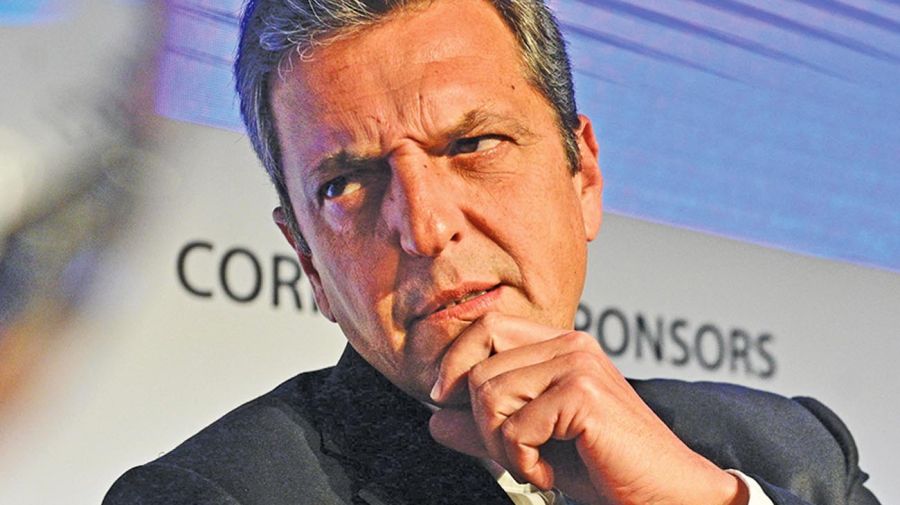
And with inflation, which you finally got down to four point something.
Yes, because we could halve inflation in four months, yes.
And the other important bill is the tax whitewash on the basis of the agreement with the United States to exchange tax information.
Firstly, when we made our first trip to the United States and raised the issue, I got sick of hearing people telling me: “They’re not going to give you an inter-governmental agreement (IGA), Argentina has been asking for one for 30 years and you want it in three months.” On a television channel I saw a former Economy minister saying: “What Argentina did not get in 30 years, Massa’s not going to get in three months.” And in reality it seems to me important to understand that if there is one thing the United States does not want to be by definition, it is a tax haven. That’s why it signed the Foreign Account Tax Compliance Act (FATCA)and the IGA 1.
We did it and presented the bill with simple mechanisms and accessible whitewash rates but people should also know that come September 30, they will not be incurring penalties which could carry the impact of freezing their accounts in the United States with a 40 percent loss of their assets. My constructive advice to anybody who has the opportunity and possibility given by this law to regularise their situation by going to the AFIP tax bureau would thus be to go ahead and do it.
What is your estimate of the total sum of undeclared money?
I’m one of those people who count the money in their pockets rather than make estimates because if you overshoot, they will say you underestimated it because you wanted to hide funds and if you fall short, they will say you failed. So the best thing is to make a decision, go ahead with it and show the results.
There are discussions about the number of exchange rates (the dólar soja, the dólar Qatar, etc.) which are not sustainable in the long term.
I totally agree and we have to try and construct a path leading to the normalisation of the exchange rate and access to capital markets.
Would that mean modifying exchange rate markets?
But that’s going to take time because it’s not something born yesterday. If we shut our eyes and look back, it’s a problem we Argentines have been carrying for ages. In reality it has to do with that restriction which has its explanation for why Argentina has balance of payments and currency crises every 10 years – for two central reasons. Firstly, we export US$600 per ton on average and import US$1,100 per ton on average, leading to restrictive cycles every five or 10 years. The challenge is to increase exports in, for example, the knowledge industry and human capital. Argentina manufactures great satellites and nanosatellites with a ton of satellites worth 700 times more than a ton of spaghetti. So the laws of biotechnology, nanotechnology, the knowledge economy and the taxation of the technologically self-employed aim at trying to expand the volume of exports from the sector of the knowledge economy. This year it’s going to be one of Argentina’s five major players and export complexes. Where else do we face challenges? In the car industry we have to...
... convert lithium.
Exactly, so that lithium, which is a raw material, becomes part of the value-added chain throughout the auto complex and an additional asset for Argentina. Where we have the most opportunities is in the gas sector if we add value, hence the liquefied natural gas law because it is one thing to have the capacity to export it only to Brazil or Chile and quite another to ship it worldwide. But it’s not only that, we have to look at how we can construct fertiliser plants with Vaca Muerta gas. We’ll be talking to [German Chancellor Olaf] Scholz about that when he visits.
You spoke about investment, Argentina’s stock exchange is at record levels with the fastest-growing shares.
In the last five months, yes. I was looking last week at a report including surges of almost 400 percent with YPF [oil] and TGS [gas transport] in the lead and there I come back to what we have not been looking at and which earned the applause of Paolo. In reality, the importance of the Argentine fossil fuel complex, the importance of Neuquén, Chubut, Santa Cruz, Tierra del Fuego, Río Negro and southern Mendoza but also the scope we still have to explore and exploit the Northern Basin.
What does the growth of Argentine assets indicate? Before you wanted to talk about the rise of investment as a percentage of GDP.
An investment rate of 21 percent is one of the highest in the last 10 years in Argentina.
What does that indicate?
It indicates that Argentina is a country which has a lot to offer a world in crisis. Argentina and Brazil produce 42 percent of the proteins consumed by the world. Argentina, Bolivia and Chile are the leading global suppliers of the lithium which the world needs. Argentina and Chile are the world’s second players for copper. Argentina also has the world’s second-largest reserves of shale gas and the fourth-largest of shale oil. Furthermore, Argentina is the leading exporter of human capital in the knowledge industry throughout the region.
So we have problems because we often run away from the idea of fiscal order, which is good, and we run away from the idea of accumulating reserves and we don’t look after our dollars. Accumulating reserves, being competitive from the viewpoint of the exchange rate and having export capacity is central, apart from our having a unique geopolitical position. The next 20 years could be as important for Argentina as it was for the Argentina which grew and developed with the agricultural revolution accompanying the Industrial Revolution.
You are referring to that period in 1910 when Argentina came to be the planet’s seventh economy.
Exactly. I believe that for Argentina in the next 20 years, due to its competitive knowledge economy, the talent of Argentines, which we see when we look at the quantity of start-ups and at who’s leading the most important technological projects and when we see the level of demand for INVAP [nuclear technology], which we in Argentina would seem not to have registered but is one of the major players in global terms. All the companies of biotechnology and nanotechnology developed by the private sector, the bio-CEOs of this world, developed by the farm sector and Argentine labs, have a unique global opportunity.
Our time’s running out and I’d like to leave the last few minutes for your reflections on the economic players, the consumers and the producers.
What would please me is that those who should invest do invest because they have all the support and all the ground rules.
That they should not fear.
That they should not fear because they’re going to have all our support. We’re working to recover [real] wages because the middle class and Argentine workers have had a rough time. But above everything, let us have a constructive outlook on Argentina, that we push aside those who only seek to do damage and have our eyes and ears open to those with the will to construct Argentina.
There is one thing to be sought and that is that if things go well for me, they do not go well for Massa, they go well for Argentina. And then there are those who would seek to have me fail because they believe it would be my failure. If the measures we take fail, they fail for the Argentine economy. So they should help out and accompany, taking the hatred out of their systems and dedicating themselves to constructive proposals.
Production: Melody Acosta Rizza and Sol Bacigalupo.








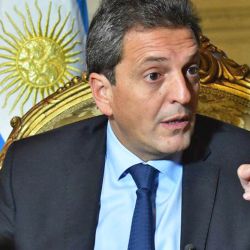

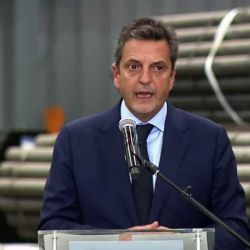
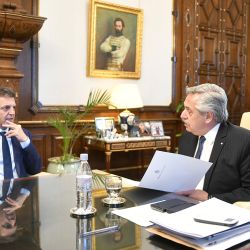









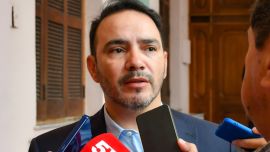
Comments